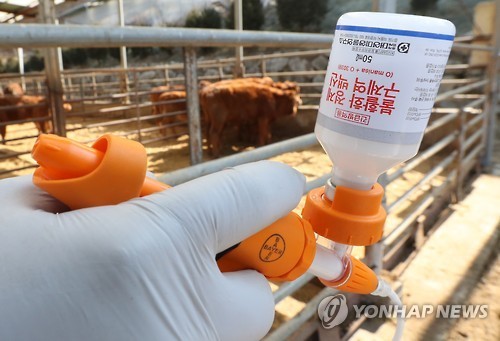South Korea's plan to import a vaccine against food-and-mouth disease from a British company may end up in smoke as it has yet to respond to a Seoul request for an emergency import, sources said Friday.
South Korea remains gripped by a serious undersupply of FMD vaccines following the simultaneous outbreak of type A and type O viruses. Since the first outbreak on Feb. 5, nearly 800 cows have been culled so far.
 |
This undated file photo shows an FMD vaccine (Yonhap) |
After a type A case was reported at a cow farm northeast of Seoul on Feb. 8, the Ministry of Agriculture, Food and Rural Affairs requested Merial to allow an emergency import of vaccines for the type O+A virus, which are also effective in treating cows hit by the type A virus.
South Korea has vaccines for the type O+A virus but only for about 1.9 million cows, not enough for the 2.8 million cows that require it, according to officials.
"We are trying to secure additional vaccines by contacting Merial's South Korean subsidiary and its head office in France, but we have yet to receive any response from the company," a ministry official said.
Merial, a leading global animal health and vaccine manufacturer, has been South Korea's main source of vaccine imports.
The government has also been contacting vaccine makers in China and Argentina, but such efforts have yet to produce tangible results, according to sources.
Should such a situation continue, South Korea will be able to import vaccines for the type O+A virus only around the end of this month, when it is slated to receive shipments in line with earlier contracts.
Under the deals, South Korea will import vaccines against the type O+A virus for 1.6 million cows and type O vaccines for 3.2 million cows around the end of February.
Industry exports pointed out the episode over the government's push for an emergency vaccine import vividly shows South Korea's total reliance on imports for vaccines, stressing the need to develop homegrown vaccines as quickly as possible.
Currently, the South Korean government spends some 60 billion won ($52.4 million) per year to import FMD vaccines. Seoul plans to build a vaccine plant by 2020 at a cost of 69 billion won.
Meanwhile, South Korean startup Pharos Vaccine Inc. said Thursday it has succeeded in developing an FMD vaccine using the so-called recombinant protein technology and will be able to commercialize it as early as next year.
Four days after the first outbreak, the ministry raised its FMD alert to the highest level, closing all livestock trading markets nationwide while imposing a movement ban on animals until Feb. 28.
It is the first time in seven years that the country has issued the highest alert against the FMD virus. In 2010, nearly 3.5 million cows and pigs were culled in over six months following an outbreak of the disease, which affects cloven-hoofed animals, such as cows, sheep and pigs. South Korea reported its last outbreak of the disease on March 29 last year, which does not affect humans. (Yonhap)




![[Herald Interview] 'Trump will use tariffs as first line of defense for American manufacturing'](http://res.heraldm.com/phpwas/restmb_idxmake.php?idx=644&simg=/content/image/2024/11/26/20241126050017_0.jpg)

![[Health and care] Getting cancer young: Why cancer isn’t just an older person’s battle](http://res.heraldm.com/phpwas/restmb_idxmake.php?idx=644&simg=/content/image/2024/11/26/20241126050043_0.jpg)

